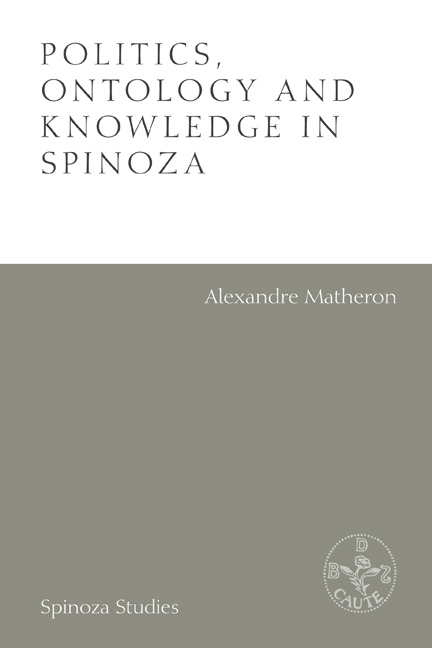Book contents
- Frontmatter
- Contents
- Abbreviations
- Notes on Translation and Acknowledgements
- A Revolutionary Beatitude: Alexandre Matheron’s Spinozism
- I Spinoza on Ontology and Knowledge
- 1 Idea, Idea of the Idea and Certainty in the Tractatus de Intellectus Emendatione and the Ethics
- 2 Essence, Existence and Power in Part I of the Ethics: The Foundations of Proposition 16
- 3 Physics and Ontology in Spinoza: The Enigmatic Response to Tschirnhaus
- 4 The Year 1663 and the Spinozist Identity of Being and Power: Hypothesis on a Development
- 5 Eternal Life and the Body According to Spinoza
- 6 Intellectual Love of God, Eternal Part of the amor erga Deum
- II Spinoza on Politics and Ethics
- 7 State and Morality According to Spinoza
- 8 Ethics and Politics in Spinoza (Remarks on the Role of Ethics IV, 37 Scholium 2)
- 9 Indignation and the Conatus of the Spinozist State
- 10 Passions and Institutions According to Spinoza
- 11 The Problem of Spinoza's Evolution: From the Theologico-Political Treatise to the Political Treatise
- 12 Is the State, According to Spinoza, an Individual in Spinoza’s Sense?
- 13 The Ontological Status of Scripture and the Spinozist Doctrine of Individuality
- 14 Spinoza and Power
- 15 Spinoza and Property
- 16 Spinoza and Sexuality
- 17 Women and Servants in Spinozist Democracy
- 18 The ‘Right of the Stronger’: Hobbes contra Spinoza
- 19 The Theoretical Function of Democracy in Spinoza and Hobbes
- 20 Spinoza and the Breakdown of Thomist Politics: Machiavellianism and Utopia
- Appendix 1 Interview with Laurent Bove and Pierre-François Moreau
- Appendix 2 Chronology of Works by Matheron
- Works Cited
- Index
12 - Is the State, According to Spinoza, an Individual in Spinoza’s Sense?
Published online by Cambridge University Press: 03 October 2020
- Frontmatter
- Contents
- Abbreviations
- Notes on Translation and Acknowledgements
- A Revolutionary Beatitude: Alexandre Matheron’s Spinozism
- I Spinoza on Ontology and Knowledge
- 1 Idea, Idea of the Idea and Certainty in the Tractatus de Intellectus Emendatione and the Ethics
- 2 Essence, Existence and Power in Part I of the Ethics: The Foundations of Proposition 16
- 3 Physics and Ontology in Spinoza: The Enigmatic Response to Tschirnhaus
- 4 The Year 1663 and the Spinozist Identity of Being and Power: Hypothesis on a Development
- 5 Eternal Life and the Body According to Spinoza
- 6 Intellectual Love of God, Eternal Part of the amor erga Deum
- II Spinoza on Politics and Ethics
- 7 State and Morality According to Spinoza
- 8 Ethics and Politics in Spinoza (Remarks on the Role of Ethics IV, 37 Scholium 2)
- 9 Indignation and the Conatus of the Spinozist State
- 10 Passions and Institutions According to Spinoza
- 11 The Problem of Spinoza's Evolution: From the Theologico-Political Treatise to the Political Treatise
- 12 Is the State, According to Spinoza, an Individual in Spinoza’s Sense?
- 13 The Ontological Status of Scripture and the Spinozist Doctrine of Individuality
- 14 Spinoza and Power
- 15 Spinoza and Property
- 16 Spinoza and Sexuality
- 17 Women and Servants in Spinozist Democracy
- 18 The ‘Right of the Stronger’: Hobbes contra Spinoza
- 19 The Theoretical Function of Democracy in Spinoza and Hobbes
- 20 Spinoza and the Breakdown of Thomist Politics: Machiavellianism and Utopia
- Appendix 1 Interview with Laurent Bove and Pierre-François Moreau
- Appendix 2 Chronology of Works by Matheron
- Works Cited
- Index
Summary
The question posed here is very precise. It is not: ‘Is the State in reality an individual in the real sense of the word?’ Nor is it: ‘Is the State in reality an individual in Spinoza's sense?’ Nor even: ‘Is the State, according to Spinoza, an individual in the real sense of the word?’ In the past I have answered this question in the affirmative, but without actually posing the question as such. Lee C. Rice, in a very interesting article, addressed to me, from his own strictly individualistic point of view, objections from which I learned a lot, but which, to my mind, did not entirely respond to the question as I posed it. Pierre-François Moreau then came to my defence, this time truly posing the question, by developing what I had only sketched out, and by expanding on it in an entirely original way. Then Steven Barbone, in a chapter of his excellent doctoral dissertation, returned to and developed Rice's thesis against us by laying out, with rare mastery, all the arguments that could logically be raised against us from their point of view – but which, again, and for the same reason, have not absolutely convinced me. Finally, Étienne Balibar, from his own ‘transindividualist’ perspective, dedicated an important piece to the question (not exactly the one I posed, strictly speaking) in which, having read my work against Rice's – apparently believing that this was what Moreau had done – he delivered captivating analyses with which I often agreed, but from which I do not think one could conclude that the State, according to Spinoza, is not an individual in Spinoza's sense.
Here I would like to return to the question from a quasi-‘philological’ perspective (as one says in Italy, in a generally pejorative sense) by staying at the level of the texts, and I will treat it in five points. In points I, II and III, I will analyse three passages from the Ethics that, to my mind, should be enough to decide it; in IV, I will refer to some passages from the Theologico-Political Treatise and the Political Treatise, in which I believe complementary confirmations and clarifications can be found; and I will conclude in V with a problem.
- Type
- Chapter
- Information
- Politics, Ontology and Knowledge in Spinoza , pp. 179 - 200Publisher: Edinburgh University PressPrint publication year: 2020

